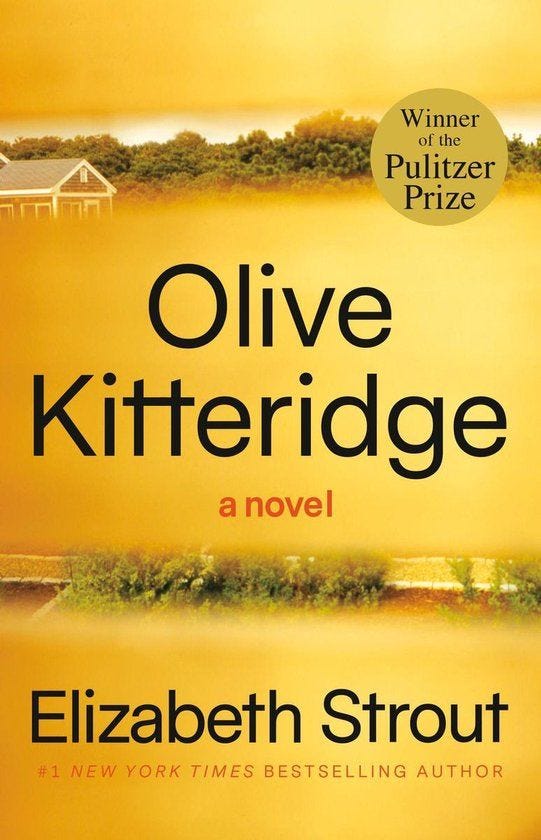Elizabeth Strout’s Olive Kitteridge is a collection of 13 non-chronological but loosely related short stories about the minutiae of life and relationships—you know, those seemingly unimportant things that just are and are quite difficult to capture in writing: the quiet admiration of young people; the complicated nuances between couples who have been married for a long time; the ordinary and yet inevitable ways people fall in and fall out of love; the petty grievances that come with the messy business of living; the scandals people hide from their partners; children breaking their parents’ hearts with the way they lead their lives, and so much more. She writes about many “social causes,” but they don’t feel that way. They only register as social causes after the fact. She writes about suicide and suicidal ideation, anorexia, infidelity, politics, trauma, terminal illness, divorce, death, and more tropes that are “socially relevant.” (The quotes communicate my strong dislike for people who care about stuff like that in fiction.)
Elizabeth Strout (at least in Olive Kitteridge) writes in a “zoomed-in” style. Her focus is zoomed all the way in on people’s emotions and thought processes and their day-to-day lives. She zooms out sometimes but only to provide context, then zooms back in to focus on the inner lives of her characters. If nothing else, Strout made me think about oldness in a new way. It’s fascinating what you learn when you pay attention to old age and the inconveniences that come with being old: explosive diarrhea, heart attacks, bad necks and backs, anxiety about dying, and all that jazz.
It’s different, this style of writing. It’s not what I am used to. And no, it’s nothing like Jhumpa Lahiri’s style (because Lahiri too writes about the mundane and many similar tropes but they are nothing alike style-wise). The stories in this collection are not “sweet”; neither are they “interesting” in that Nigerian way that things are interesting. There are no grandiose actions, no juicy secrets, and no big reveals. Even the infidelity is not dramatic. Many people who are not familiar with this style will find it boring. But I liked it, and I learned a lot from reading the collection.
I like the way Strout moves across time in short, simple sentences. I like how she packs a ton of information into a single paragraph. I like how she conveys the motivation of her characters, how normal they seem, and how they are all conflicted internally even if they project something different externally. She really gets into the heads of her characters, and that takes skill. This review contains no spoilers and I want to keep it short but here’s one of many sentences that stood out to me: “The tulips bloomed in ridiculous splendor.”
I, however, do not like the over-description of the weather and landscapes. It’s probably because I’m not American and don’t care about fall and winter. Olive Kitteridge is set in a coastal town in Maine; it’s provincial. The wind picks up at the bay and there are dinghies, and the water ripples… I thought it was too much. There’s only so much snow and leaves and summer heat I can take, and I was sick of all that when I got to the fifth story. It’s cold, we know. Move on! Strout also tends to repeat the same thing over and over again for emphasis, but sometimes it is repeated too often—about three times on the same page. It’s almost as though she thinks her readers have forgotten that Mr. Lydia is a squat man.
The pacing was also rather slow, which tends to happen when you write about the mundane but sometimes, it dragged. Calling it a “novel-in-stories” is a stretch. A few characters recur, and Olive Kitteridge appears in almost every story. Sometimes, she features heavily, and other times, her appearance is flimsy. Olive Kitteridge is not a novel. The publishers and marketers probably thought it would sell better if they called it a novel.
You should read Olive Kitteridge if you want to see something different style-wise. Strout’s voice is unconventional. She uses the passive voice often (they tell you never to do this when you start writing, but what are rules if you can’t break them?) and it works. Strout is funny when she needs to be, even though most of her stories aren’t necessarily humorous. In one story, a husband bit his wife, yes, with his teeth, chomp chomp 😂.
If you’ve made it this far and you like the things I said about this book, then consider reading it.
H/T to Olamide Àdìó for gifting me the book.




